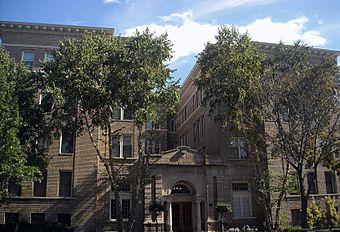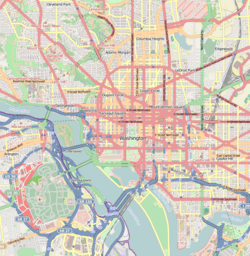Whitelaw Hotel facts for kids
Quick facts for kids |
|
|
Whitelaw Hotel
|
|
|
U.S. Historic district
Contributing property |
|
 |
|
| Location | 1839 13th St. NW Washington, D.C. |
|---|---|
| Built | 1919 |
| Architect | Isaiah T. Hatton |
| Architectural style | Renaissance Revival |
| Part of | Greater U Street Historic District (ID93001129) |
| NRHP reference No. | 93000595 |
| Added to NRHP | July 14, 1993 |
The Whitelaw Hotel is an important historic building in Washington, D.C.. It is located in an area called the U Street Corridor. This building was added to the National Register of Historic Places in 1993. This means it is a special place worth protecting because of its history.
Contents
History of the Whitelaw Hotel
The Whitelaw Hotel was built in 1919. It was designed to be a fancy apartment hotel. The building cost $158,000 to build. It was made in a style called Renaissance Revival, which looks like old Italian buildings.
Designed by a Pioneer Architect
The person who designed the hotel was Isaiah T. Hatton. He was one of the first African American architects in the United States. The hotel was named after the mother of its builder, John Whitelaw Lewis. Mr. Lewis was an entrepreneur, meaning he started and ran businesses. He also started the Industrial Savings Bank.
A Place for African Americans During Segregation
What makes the Whitelaw Hotel very special is that it was completely funded and built by African American business owners, investors, designers, and workers. At that time, many places in the U.S. had "segregation." This meant that Black people were kept separate from white people. They were not allowed to stay in the same hotels or use the same public spaces.
The Whitelaw Hotel became a safe and welcoming place for important African Americans. It was a place where they could meet and stay. Famous entertainers, like Cab Calloway, stayed there when they performed on U Street. Other African Americans came to Washington for meetings of national Black organizations. They could not stay in other hotels in the city, so the Whitelaw was very important.
Listed in the Green Book
The hotel was even listed in "The Green Book." This was a special guide for African American travelers. It helped them find places where they would be safe and welcome during segregation. The Whitelaw's large public rooms also made it a major social center for the community.
Changes Over Time
After segregation became illegal in the United States, the Whitelaw Hotel became less busy. It was closed by the city in 1977 and was planned to be torn down. However, a company called Manna, Inc. bought the building in 1991. They used special tax credits for historic buildings to fix it up. The hotel reopened in 1992. Today, it provides homes for people with low and moderate incomes.
 | Aaron Henry |
 | T. R. M. Howard |
 | Jesse Jackson |


